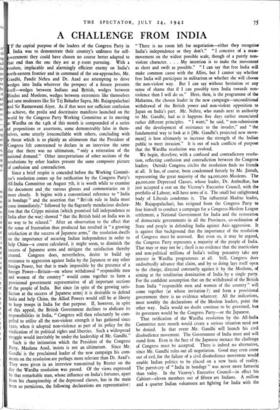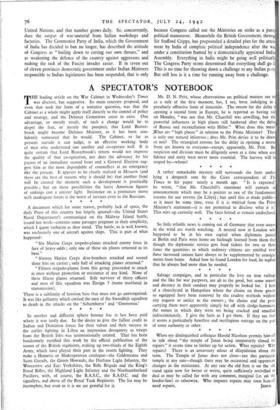A CHALLENGE FROM INDIA
F the capital purpose of the leaders of the Congress Party in India was to demonstrate their country's unfitness for self- overnment they could have chosen no course better adapted to at end than the one they are at present pursuing. With a esolute, implacable and alarmingly efficient enemy on India's orth-eastern frontier and in command of the sea-approaches, Mr. andhi, Pandit Nehru and Dr. Azad are attempting to drive edges into India wherever the prospect of a fissure presents tself—wedges between Indians and British, wedges between indus and Moslems, wedges between extremists like themselves nd sane moderates like Sir Tej Bahadur Sapru, Mr. Rajagopalachari d Sir Ramaswami Aiyer. As if that were not sufficient confusion o achieve, the prolix and doctrinaire manifesto launched on the orld by the Congress Party Working Committee at its meeting t Wardha on the 14th of this month is compounded of a series f propositions or assertions, some demonstrably false in them- elves, some utterly irreconcilable with others, concluding with threat which is so plainly an ultimatum that the President of gress felt constrained to declare in an interview the same ay that there was no ultimatum, " only a reiteration of the tional demand." Other interpretations of other sections of the esolutions by other leaders present the same composite picture of confusion and contradiction.
Since a brief respite is conceded before the Working Commit- ee's resolution comes up for ratification by the Congress Party's All-India Committee on August 7th, it is worth while to examine the document and the various glosses and commentaries on it more closely. It begins with a conventional reference to " India in bondage " and the assertion that " British rule in India must cease immediately," followed by the flagrantly mendacious declara- tion that the Cripps mission (which promised full independence to India after the war) showed " that the British hold on India was in no way to be relaxed." After an observation to the effect that the sense of frustration thus produced has resulted in " a growing satisfaction at the success of Japanese arms," the resolution dwells on the importance of securing Indian independence in order to help China—a course calculated, it might seem, to diminish the success of Japanese arms and mitigate the satisfaction thereby created. Congress does, nevertheless, desire to build up resistance to aggression against India by the Japanese or any other foreign Power, but that is made impossible by the presence of a foreign Power—Britain—on whose withdrawal " responsible men and women of the country " would come together to form a provisional government representative of all important sections of the people of India. But since (in spite of the growing satis- faction at the success of Japanese arms) it is desirable to defend India and help China, the Allied Powers would still be at liberty to keep troops in India for that purpose. If, however, in spite of this appeal, the British Government declines to abdicate its responsibilities in India, " Congress will then reluctantly be com- pelled to utilise all the non-violent strength it has gathered since 192o, when it adopted non-violence as part of its policy for the vindication of its political rights and liberties. Such a widespread struggle would inevitably be under the leadership of Mr. Gandhi."
Such is the intimation which the President of the Congress Party, Maulana Azad, insists is not an ultimatum. Since Mr. Gandhi is the proclaimed leader of the new campaign his com- ments on the resolution are perhaps more relevant than Dr. Azad's. They were given in an interview transmitted by Reuter on the day the Wardha resolution was passed. Of the views expressed by that remarkable man, whose influence on India's fortunes, apart from his championship of the depressed classes, has in the main been so pernicious, the following declarations are representative: " There is no room left for negotiation—either they recognise' India's independence or they don't." " I conceive of a mass- movement on the widest possible scale, though of a purely non- violent character. . . . My intention is to make the movement as short and swift, as possible." " I can say that free India will make common cause with the Allies, but I cannot say whether free India will participate in militarism or whether she will choose the non-violent way. But I can say without hesitation or any sense of shame that if I can possibly turn India towards non- violence then I will do so." Here, then, is the programme of the Mahatma, the chosen leader in the new campaign—unconditional withdrawal of the British power and non-violent opposition to japan on India's part. Mr. Nehru, who stands next in authority to Mr. Gandhi, had as it happens five days earlier enunciated rather different principles. " I want," he said, " non-submission and the development of resistance to the invader," and " the fundamental way to look at it [Mr. Gandhi's projected new move- ment] is how ultimately to increase the strength of the Indian public to meet invasion." It is out of such conflicts of purpose that the Wardha resolution was evolved.
We begin, therefore, with a confused and contradictory resolu- tion, reflecting confusion and contradiction between the Congress leaders. Outside Congress circles the resolution finds no friends at all. It has, of course, been condemned fiercely by Mr. Jinnah, representing the great majority of the 94,000,000 Moslems. The 49,000,000 Depressed Classes, whose leader, Dr. Ambedkar, has just accepted a seat on the Viceroy's Executive Council, with the portfolio of Labour, will have none of it. The small but enlightened body of Liberals condemns it. The influential Madras leader, Mr. Rajagopalachari, has resigned from the Congress Party to free himself to conduct a campaign for a Congress-Moslem League settlement, a National Government for India and the restoration of democratic governments in all the Provinces, co-ordination of State and people in defending India against Axis aggression. It is against that background that the importance of the resolution of Congress must be assessed. But even so, it may be argued, the Congress Party represents a majority of the people of India. That may or may not be ; there is no evidence that the inarticulate and non-political millions of India's toiling peasantry take any interest in Wardha programmes at all. Still, Congress does undoubtedly advance that claim, and by so doing lays itself open to the charge, directed constantly against it by the Moslems, of, aiming at the totalitarian domination of India by a single party. For the confident assumption that on the withdrawal of the British from India " responsible men and women of the country " will come together (at whose invitation 1) and form a provisional government there is no evidence whatever. All the indications, most notably the declarations of the Moslem leaders, point the other way. India would no doubt continue to be governed, bus its governors would be the Congress Party—or the Japanese.
That ratification of the Wardha resolution by the All-India Committee next month would create a serious situation need not be denied. In that event Mr. Gandhi will launch his civil disobedience movement. The Government of India must and will stand firm. Even in the face of the Japanese menace the challenge of Congress must be accepted. There is indeed no alternative, since Mr. Gandhi rules out all negotiation. Good may even come out of evil, for the failure of a civil disobedience movement would enable Indian politics to be placed on a new basis of reality. The parrot-cry of " India in bondage " was never more fantastic than today. In the Viceroy's Executive Council—in effect his Cabinet—eleven members out of fifteen are Indians. A million and a quarter Indian volunteers are fighting for India with the United Nations, and that number grows daily. So, concurrently, does, the output of war-material from Indian workshops and factories. The Communist Party of India, which the Government of India has decided to ban no longer, has described the attitude of Congress as " boiling down to cutting our own throats," and as weakening the defence of the country against aggressors and making the task of the Fascist invader easier. If in seven out of eleven provinces democratic government under Indian Ministers responsible to Indian legislatures has been suspended, that is only because Congress called out the Ministries on strike as a purel political manoeuvre. Meanwhile the British Government, throu Sir Stafford Cripps, has propounded a detailed plan for the atta meat by India of complete political independence after the w under a constitution framed by a democratically appointed Indi Assembly. Everything in India might be going well politically The Congress Party seems determined that everything shall go This is no time for throwing down a challenge to any Indian pu But still less is it a time for running away from a challenge.



























 Previous page
Previous page